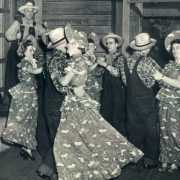Sheriffs: Who Are They and What Are Their Duties?
Many of us had our first real look at a sheriff’s office back in 1960 when Andy Taylor and his fearless deputy, Barney Fife, patrolled the roads in and around Mayberry, N.C.
Television took us inside the Mayberry jail, the courthouse, and it even allowed us to ride in the county patrol car. And, for many people, Andy Taylor’s Sheriff’s Office was thought to be the standard.
The things Andy did, well, that’s what a sheriff was supposed to do—fight crime, run the jail, serve the people of the community, spend quality and quiet time with his family and friends—Aunt Bee, Barney, Opie and Miss Ellie and later, Helen, and pickin’ and grinnin’ with the Darlings. Simply a wholesome way of work and play.
But that’s the TV depiction of the life of a county sheriff. Real sheriffin’, however, is a bit different. So, let’s take a brief look at a real-life sheriff and her/his office to see how things differ from the fictional Mayberry department.
First, like Andy, a sheriff is only one person, an elected official who’s in charge of the day-to-day operations of their office.
Because there is only a single sheriff for each jurisdiction, it is in error to call or address the other employees of the agencies as “sheriffs.” This is a common mistake I often hear.
“The sheriff came to my house to deliver a jury summons.”
“Look, here comes a sheriff is driving down the street. Bet she’s going straight to Junior, Jr’s house about them pigs he keeps in the backyard.”
“Two sheriffs went next door and arrested Jim Billy Buck for bustin’ Larry John, Jr.’s jaw with a rusty claw hammer.”
“There are three sheriffs eating donuts and drinking coffee at Delirious Daisy’s Donut Diner.”
So, only one sheriff per office, and, since the sheriff has many responsibilities, they need help to fulfill their duties. Consequently, the sheriff appoints deputies to help with the workload.
Therefore, the drivers of those marked “sheriff’s” cars, the three donut-eaters, arresters of the claw hammer assaulter, jury summons server, and others who work at a sheriff’s office, are typically deputy sheriffs, not the actual sheriff. Unless, of course, the boss happens to be driving one of the marked units, is inside the Donut Diner with two sheriffs from other counties, and decides to serve a jury summons in person (not likely).

Deputy Sheriff
In most locations, deputies serve at the pleasure of the sheriff, meaning they can be dismissed from duty without cause or reason.
Sheriffs in America
There are 3,081 sheriffs in the U.S.
In many areas, the sheriff is the highest-ranking law enforcement officer in the county.
Sheriffs are constitutional officers, meaning they are elected to office by popular vote. Police Chiefs are appointed/hired by a mayor or other officials of a city, such as a city or town council or police commission.
In most states, Sheriffs are elected to four-year terms. Other states require different terms of office, such as a six-year term in one state, a three-year term in another state, and a two-year term in three states.
Generally, sheriffs do not have a supervisor. They don’t answer to a board of supervisors, commissioners, or a county administrator.
Fun Fact – The Los Angeles County Department, the largest sheriff’s department in the world, employs nearly 18,000 budgeted sworn and professional staff. The number of LASD employees is greater than the combined populations of Wyoming counties Sublette and Johnson.
Sheriffs are responsible for:
1) Executing and returning process, meaning they serve all civil papers, such as divorce papers, eviction notices, lien notices, etc. They must also return a copy of the executed paperwork to the clerk of court.
2) Attending and protecting all court proceedings within the jurisdiction.
3) Preserve order at public polling places.
4) Publish announcements regarding the sale of foreclosed property. The sheriff is also responsible for conducting public auctions of foreclosed property.
5) Serving eviction notices. The sheriff must sometimes forcibly remove tenants and their property from their homes or businesses. I’ve known sheriffs who use jail inmates (supervised by deputies) to haul property from houses out to the street.
6) Maintain the county jail and transport prisoners to and from court appearances. The sheriff is also responsible for transporting county prisoners to state prison after they’ve been sentenced by the court.
7) In many, if not most, areas the sheriff is responsible for all law enforcement of their jurisdiction. Some towns do not have police departments, but all jurisdictions, apart from Alaska, Hawaii, and Connecticut, must have a sheriff’s office.
- In Alaska, there are no county governments.
- Connecticut replaced sheriffs with a State Marshal System Connecticut.
- There are no Sheriffs in Hawaii. However, Deputy Sheriffs serve in the Sheriff Division of the Hawaii Department of Public Safety.
8) In California, some sheriffs also serve as coroners of their counties.

California sheriff’s public display of water patrol and rescue equipment, and a tent with “Coroner” labeling.
9) In most jurisdictions, sheriffs and their deputies have arrest powers in all areas of the county where they were elected, including all cities, towns, and villages located within the county.
10) Sheriffs in the three counties of the state of Delaware do not have typical police powers. Yes, there are only three counties in the state of Delaware.
DELAWARE
§ 2103 SHERIFFS AND REGULAR DEPUTIES.
Sheriffs and deputy sheriffs shall not have any arrest authority. However, sheriffs and deputy sheriffs may take into custody and transport a person when specifically so ordered by a judge or commissioner of Superior Court.
In Delaware, the duties of the county sheriffs and their deputies are:
Sussex County – Serve paper for the courts and holds Sheriff’s sales for non-payment of taxes, mortgage foreclosures plus all other court orders.
New Castle County – Provides service of process for writs issued by the Superior Court, Court of Common Pleas, Court of Chancery, Family Court and courts from other states and countries along with subpoenas issued by the Department of Justice, Department of Labor, and Industrial Accident Board.
Kent County – Service the Citizens of Kent County by performing many functions for the State of Delaware Courts (Superior Court, Court of Common Pleas, U.S. District Court and the Court of Chancery). The Sheriff’s Office serves legal notices to include (subpoenas, levies, summons, etc.) Additionally, the Sheriff’s Office auctions real estate in accordance with the Delaware Code.
The above list of sheriff’s responsibilities is not all-inclusive. Sheriffs and deputies are responsible for numerous duties and assignments in addition to those listed here.
Is It Sheriff’s Office or Sheriff’s Department? What’s the Difference?
Black’s Law Dictionary defines the terms as:
DEPARTMENT: “One of the major divisions of the executive branch of the government … generally, a branch or division of governmental administration.”
OFFICE: “A right, and correspondent duty, to exercise public trust as an office. A public charge of employment… the most frequent occasions to use the word arise with reference to a duty and power conferred on an individual by the government, and when this is the connection, public office is a usual and more discriminating expression… in the constitutional sense, the term implies an authority to exercise some portion of the sovereign power either in making, executing, or administering the laws.”
A Sheriff’s Office is not a “department” of county government. The functions and operation of an Office of Sheriff are entirely and solely the responsibility of the elected Sheriff. The Sheriff is a statutory/constitutional officer who has exclusive powers and authority under state law and/or state constitution. Therefore, a sheriff’s powers are not subject to the directives and orders of a local county government, whereas the heads of county departments are subordinate to the local administration because each department is a division of county government.
In 1889, Sheriff Joe Perry was sworn in as sheriff in St. Johns County, Florida, and he held the office for 26 years. Perry is the longest serving sheriff in Florida history.
National Sheriffs’ Association
The National Sheriffs’ Association (NSA) officially came into being when the organization filed Articles of Incorporation in 1940. However, over 50 years earlier, in 1888, a group of sheriffs in Minnesota and surrounding states joined together to form the Inter-State Sheriffs’ Association. The NSA today is the result of the early group.
The NSA is involved in and provides resources, various programs, training classes, and courses to support and assist sheriffs, deputies, and others in law enforcement and criminal justice.
As of February 15, 2023, NSA has 13,628 active members.
I am one of those members and have been for many years.

Office of Sheriff, Its Historical Roots
“In England, the sheriff came into existence around the 9th century. This makes the sheriff the oldest continuing, non-military, law enforcement entity in history.
In early England, the land was divided into geographic areas between a few individual kings – these geographic areas were called shires. Within each shire there was an individual called a reeve, which meant guardian. This individual was originally selected by the serfs to be their informal social and governmental leader. The kings observed how influential this individual was within the serf community and soon incorporated that position into the governmental structure. The reeve soon became the King’s appointed representative to protect the King’s interest and act as mediator with people of his particular shire. Through time and usage, the words shire and reeve came together to be shire-reeve, guardian of the shire, and eventually the word sheriff, as we know it today.” – National Sheriffs’ Association
It’s Coming. It’s Unique. And IT IS EXCITING!


Full event details TBA










I enjoy your posts! I was particularly interested in how the word SHERIFF came about! Thanks.
Thank you, Lee, for the informative and interesting post. I live in St John’s County FL so the story of Joe Perry is fun. I also took the Citizens Law Enforcement Academy here and while I learned lot about how our policing is organized and carried out, your post still gave me new insight. I live in an area of St John’s County that does not have its own police force so our sheriff and deputies are who we rely on.
What an interesting post this was. I learned a lot.
Have you been following the news about the shootout earlier this week in Pittsburgh that began when Sheriff’s Deputies tried to serve an eviction notice? https://www.post-gazette.com/news/crime-courts/2023/08/23/pittsburgh-garfield-shooting-police/stories/202308230090